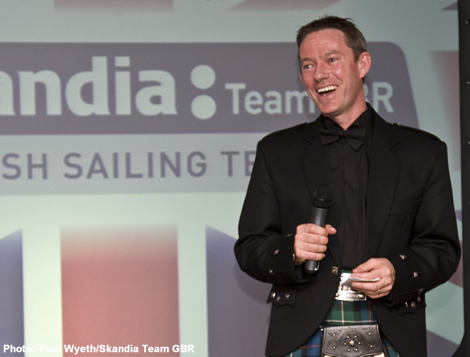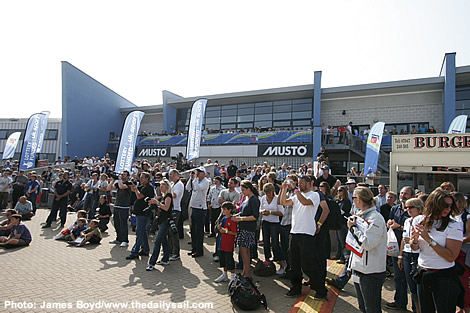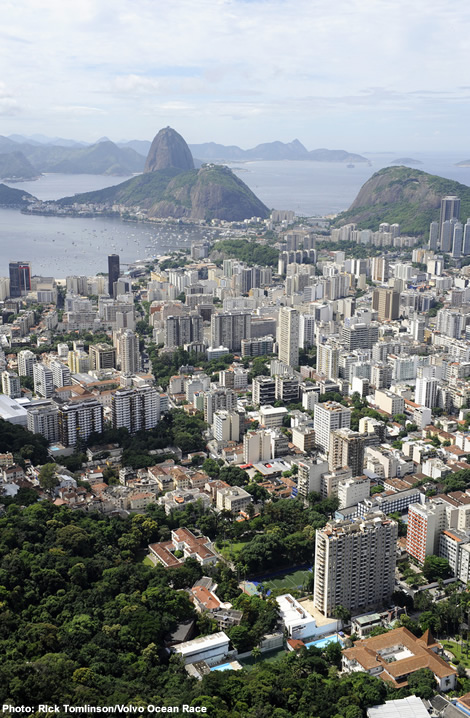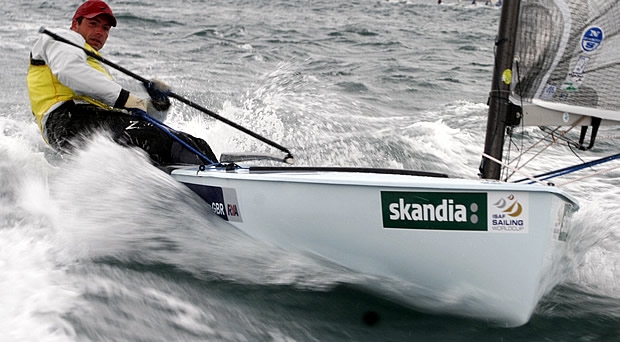Stephen Park - part 2
This article follows on from part one here
£££££
Mainstay of the Skandia Team GBR’s funding comes from the UK’s National Lottery and in this department there is both good and bad news at present.
Obviously the UK remains in the midst of a profound economic meltdown, but oddly this has resulted in an upturn in lottery receipts. “It is one of those strange statistics that when times are hard people gamble a bit more," says RYA Olympic Manager, Stephen Park. "So in terms of the money that goes into sport that has gone up a little bit.”
So that is the good news. The bad is that in the UK Sport funding announcement made just before Christmas the amount of money coming into sailing from the lottery has been cut by 9% for the period starting this April.

“They have extended the number of sports they are supporting,” explains Park. “There were some criticism that UK Sport was choosing to support all the sports to the detriment of the sports that were actually going to win medals. They have a process which they are determining who will win medals, but that system could end up with the rich getting richer, because it is based on past results. If you don’t support some of the sports to a certain extent it is hard for them to get to the first rung on the ladder. So they are in a difficult situation. We make a pretty good case for our share and then we just get on with what we’ve got. Equally, we are also conscious that we are one of the better-funded sports.”
The reduced money for sailing amounts to £22,926,600, which sounds like an astronomic sum, but as Park explains this is the total sum for a four year period and importantly is not just for the Olympic program. It including funding for the RYA’s junior and youth programs, the running of events and much more. He estimates that in fact around £2 million a year goes towards Skandia Team GBR’s Olympic program, but even that is variable. “One of the discussions we have at this time of year is - do we spend more money in the youth or junior program, or in coaching, facilities, events, more equipment, etc etc? So we have a certain amount of flexibility to move the money between the pots against the targets we’ve agreed with UK Sport.”
Competition
While Skandia Team GBR may still be top dog in terms of Olympic results and certainly should be helped by the 2012 Games being on home territory, there remains the nagging possibility that another nation may get its act together suitably to knock the Brits from their top spot.
Team GBR’s success in sailing over the past three Olympiads has been such that many of the top nations have started to look closely at the nuts and bolts of the British team’s set-up and the reasons for their success. The Alphagraphics-backed US sailing team for example have even sent delegates over to the RYA to see how they do things. Various other national teams have been taking leaves from the GBR book, however the process of nurturing talent through the junior and youth programs – core to the British team’s success – is obviously not something that can pay dividends overnight.
“I think it is inevitable,” says Park of whether he thinks that the Briitish team will be surpassed. “You’d have to say that it is going to be pretty tough for nations in the next couple of Olympics to be winning five or six medals as we have done in the last couple, because the competition is getting stronger and stronger and some nations have tried to look at what we are doing and copy it - some more exactly than others. Some have said ‘what are the good things they are doing? Let’s tailor those to work for ourselves.’ There are a lot worse things you could do. It is flattering.”
Chief competition, in terms of success across all Olympic sailing classes, will obviously come from one of the current big players.
US Sailing in particular have dramatically re-arranged how they run their team. “The Americans have always been well funded but haven’t necessarily spent their money particularly wisely, some of which is historical,” says Park. “They have a new structure in terms of how they are running their program and they have clearly got some more money that is impacting on what they do. They have had facilities on the ground in Weymouth since before Beijing.”
The Dutch, Australians and Danish are equally raising their games.
Compared to these nations, Brazil traditionally take a different approach, although an equally effective one, picking the classes they are strongest in and focussing heavily on those. This approach is similar to that of emerging nations such as Poland, Slovenia, Croatia, etc. “They always do very well in four or five classes,” says Park. “They have strong people in the 470 Women, Star, windsurfing, etc. They have fewer people, but the amount of money those people get is more per head than the British sailor get, but they have less people on their program."
Despite the success of the British team, Park still reckons they are only the fifth or sixth highest in terms of their funding, although he qualifies this: “Most of the top nations would say ultimately it comes to sailors and the support staff and the programs they are running, rather than who has the most money. You have to be in the right ball park and the top eight to 10 teams are in that ball park.”
Funding can be difficult to gauge accurately between nations. He cites France, by way of example, where their budget for Olympic sailing is less, but all their coaches are provided through the education department. “So suddenly they are looking pretty good.”
Spain is also certain to be strong again. “In certain classes they have done well. They had a tough time after 1992. They won four Gold medals in Barcelona and then they had the same people going to the next couple of Games with decreasing performances. Then after 2000 they took a whole new look at it and they got a new team manager, they moved up to Santander where they are now based. They are going very well in a number of classes – the 470, really well in women’s windsurfing where they are first and second in the world and the 49er, where Iker Martinez has just won again. They have a similar funding program to ours.”

Skandia Sail for Gold
While the Olympic teams gear up for the European season’s major opener, the Trofeo Princess Sofia in Palma, followed by the summer series of Olympic class regattas, European and World Championships, etc, the big event this season is set to be Skandia Sail for Gold in Weymouth at the end of August.
This is not going to be an official Olympic ‘test event’, as took place two years out from Beijing and Athens, although once again LOCOG, the body tasked with running the Games, where the familiar figure of Rob Andrews spearheads the sailing side, will be monitoring proceedings closely.
Two and a half years out from the Games and there remains a number of items still to be decided, the major one being the location of the all-important medal races. At present it is most likely these will be held off Newton’s Cove, that lies between Portland Harbour and Weymouth. Park reckons that they continue to evaluate the viability of this at Sail For Gold this year [as well as the Olympic test event in 2011) and it may be that the organisers will keep their options open - the Cove might prove a good location in some wind directions and less so in others. If it doesn’t work then they might have to come up with some options. If there is enough wind Park reckons medal racing could be held within Portland Harbour. This would be great from a spectator point of view – while the Weymouth & Portland Sailing Academy and neighbouring marina will be closed off from the public for the duration of the Games, there is still the beach to the north of it which could be a good viewing area. But best of all though might be allowing public access to the breakwater guarding the entrance to Portland Harbour.
“It would be great to see spectators on the break water,” says Park. “That would be fantastic, but I haven’t heard anything about that. In a traditional southwesterly you could be right behind the starting area or it could be the finish...”
We ponder the reasons this hasn’t been suggested but suspect it is down to cost or health & safety issues. “Rob has always been pretty keen to try and do everything he can for the spectating side of the sport, so I can’t believe he wouldn’t have thought of that,” says Park.

Rio – 2016
Since we last caught up with the RYA Olympic Manager, Rio de Janiero has been announced at the Olympic venue for 2016. After the question marks over the sailing areas at recent Olympics in Athens and Qingdao, the prospect of racing in Rio gets a definite thumbs-up from Park.
“Visually it is a pretty impressive venue - sandy beaches, Sugarloaf Mountain, the Jesus Christ monument and bright sunlight for most of the time... We have been out there and had a look at how that might all run. Our Star experience with Percy and Bart [who won the Star Worlds there last month] was pretty positive.
“It would appear they are looking to hold a majority of the racing inside Rio Harbour - so it is going to be very tricky, a fairly light wind regatta. Most of the sailing for the Star Worlds was done outside. Imagine a Sydney type set-up with actually a bigger harbour than Sydney.”
With Brazil’s success in sailing in past Olympics along with their own home-grown stars such as Torben Grael and Robert Scheidt, the sailing side of the Games in 2016 should be in good hands.
“The sailung club in Rio - where they hosted the Star Worlds - is a massive club, with a huge amount of sailing going on there, both in terms of yachts and keelboats and Star sailing, but also massive youth and junior programs in the Oppie, Laser and 470," says Park. "They have got a lot of sailing going on there.”
He adds: “We have a huge amount of respect for how they run both their Olympic program and their events and we have every confidence that they will run a fantastic Olympic Games. Everything on shore and in terms of being a great host nation and being good for the sport, they will do very very well at it. We look forward to going training and racing there. So we are pleased that that was the outcome.”
The Games in Rio will focus around the Maracana – the biggest stadium in the world, seating 90,000 people. And while the sailing will take place in Rio. Park says it will still be some distance for the centre of action for the Games there.
In addition to their strong connection with sailing, Rio and Brazil in general will certainly be great hosts. The country is sport mad. Park says he was there recently and outside of his hotel was a 5-aside football pitch where teams were playing constantly throughout the night, non-stop every day of the week.
The only downside of Rio is the high crime rate. As Park points out: “It is one of the few places you go to where as soon as the taxi moves off the doors automatically lock. Nearly all the private cars have got bulletproof glass. Having said that, I’m pleased to say that my own personal experiences in Rio have been fine. You do have to take a bit more care and caution about where you go and when you go there. At the Volvo stopover, when you have something that becomes a focus of attention then I daresay the crime in that area goes up because it might seem to be an area where there are rich pickings. So the security side will be an issue. We are fortunate we have Group 4 Securitas as one of our sponsors!”










Latest Comments
Add a comment - Members log in